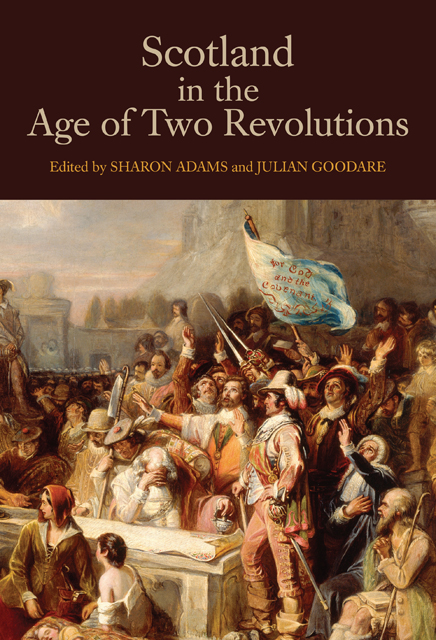Book contents
- Frontmatter
- Dedication
- Contents
- Figures and Tables
- List of Contributors
- Preface
- List of Abbreviations
- 1 Scotland and its Seventeenth-Century Revolutions
- 2 The Middle Shires Divided: Tensions at the Heart of Anglo-Scottish Union
- 3 The Western Highlands and Isles and Central Government, 1616–1645
- 4 The Scottish Bishops in Government, 1625–1638
- 5 The Scottish Revolution
- 6 In Search of the Scottish Republic
- 7 Highland Lawlessness and the Cromwellian Regime
- 8 The Worcester Veterans and the Restoration Regime in Scotland
- 9 The Political Thought of the Restoration Covenanters
- 10 Scottish State Oaths and the Revolution of 1688–1690
- 11 The Tribulations of Everyday Government in Williamite Scotland
- 12 The Company of Scotland and Scottish Politics, 1696–1701
- Chronology of Seventeenth-Century Scotland
- Further Reading
- Index
- Studies in Early Modern Cultural, Political and Social History
11 - The Tribulations of Everyday Government in Williamite Scotland
Published online by Cambridge University Press: 28 February 2023
- Frontmatter
- Dedication
- Contents
- Figures and Tables
- List of Contributors
- Preface
- List of Abbreviations
- 1 Scotland and its Seventeenth-Century Revolutions
- 2 The Middle Shires Divided: Tensions at the Heart of Anglo-Scottish Union
- 3 The Western Highlands and Isles and Central Government, 1616–1645
- 4 The Scottish Bishops in Government, 1625–1638
- 5 The Scottish Revolution
- 6 In Search of the Scottish Republic
- 7 Highland Lawlessness and the Cromwellian Regime
- 8 The Worcester Veterans and the Restoration Regime in Scotland
- 9 The Political Thought of the Restoration Covenanters
- 10 Scottish State Oaths and the Revolution of 1688–1690
- 11 The Tribulations of Everyday Government in Williamite Scotland
- 12 The Company of Scotland and Scottish Politics, 1696–1701
- Chronology of Seventeenth-Century Scotland
- Further Reading
- Index
- Studies in Early Modern Cultural, Political and Social History
Summary
Challenges of the day in the 1690s in Scotland were indeed challenges. A decade that saw revolution and counter-uprisings, famine, emigration, currency shortages and war was never likely to be an easy one for those tasked with governing the country. Even dealing with just one of those challenges would have been difficult, but a decade facing all of the calamities put enormous pressure on those in power.
Studies of this period have often been focused on the activities of the Scottish parliament during the reign of William and Mary, or, conversely, on activities at a local level. There has not been much discussion of the roles of the privy council and treasury commission. References to the treasury commission are confined to works dealing with economic policy or administration; the privy council, faring somewhat better, tends to receive attention in broader overviews and political histories. It is often recognised that James VI and I governed with the aid of the privy council in the early seventeenth century, and that the covenanters downgraded it when they introduced the committee of estates as a new central executive body. But the apparently more personal style of Restoration government has directed attention away from the privy council. And after the revolution of 1689, it has been assumed that government was carried on by parliament, aided or perhaps obstructed by the squabbling magnates of the period. What role could there be in the 1690s for the council, let alone the treasury commission?
In fact, the privy council conducted more business in the 1690s than it had done under James VI and I. After the 1689 revolution, new life was breathed into the council as it grappled with the realities of internal uprisings and invasion threats, as well as the political and religious divisions that accompanied James’s departure and the arrival of William and Mary. Along with this, military engagement, famine and the interruption of trade placed greater degrees of responsibility on the treasury commission, in particular with regard to the timely payment of military forces. The two bodies did much to uphold the stability and success of the monarchs in their northern kingdom. Their roles in military, economic and social policy will be examined here.
- Type
- Chapter
- Information
- Scotland in the Age of Two Revolutions , pp. 193 - 210Publisher: Boydell & BrewerPrint publication year: 2014
- 1
- Cited by



